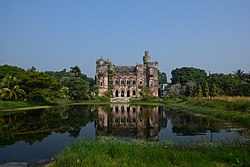Dhanyakuria is a census town in the Basirhat II CD block in the Basirhat subdivision[1] in the North 24 Parganas district in the state of West Bengal, India.[2][3]
Dhanyakuria | |
|---|---|
Census Town | |
 Dhanyakuria castle | |
| Coordinates: 22°42′12″N 88°45′26″E / 22.703409°N 88.757243°E | |
| Country | |
| State | West Bengal |
| District | North 24 Parganas |
| Population (2011) | |
| • Total | 5,148 |
| Languages | |
| • Official | Bengali, English |
| Time zone | UTC+5:30 (IST) |
| PIN | 743437 |
| Telephone code | 03217 |
| ISO 3166 code | IN-WB |
| Vehicle registration | WB |
| Lok Sabha constituency | Basirhat |
| Vidhan Sabha constituency | Basirhat Uttar |
| Website | north24parganas |
Geography edit
5miles
River
River
River
check post
M: municipal town, CT: census town, R: rural/ urban centre
Owing to space constraints in the small map, the actual locations in a larger map may vary slightly
Location edit
Dhanyakuria is located at 22°42′12″N 88°45′26″E / 22.703409°N 88.757243°E.
Area overview edit
The area shown in the map is a part of the Ichhamati-Raimangal Plain, located in the lower Ganges Delta. It contains soil of mature black or brownish loam to recent alluvium. Numerous rivers, creeks and khals criss-cross the area. The tip of the Sundarbans National Park is visible in the lower part of the map (shown in green but not marked). The larger full screen map shows the full forest area.[4] A large section of the area is a part of the Sundarbans settlements.[5] The densely populated area is an overwhelmingly rural area. Only 12.96% of the population lives in the urban areas and 87.04% of the population lives in the rural areas.[6][7]
Note: The map alongside presents some of the notable locations in the subdivision. All places marked in the map are linked in the larger full screen map.
Demographics edit
According to the 2011 Census of India Dhanyakuria had a total population of 5,148, of which 2,640 (51%) were males and 2,508 (49%) were females. Population in the age range 0–6 years was 415. The total number of literate persons in Dhanyakuria was 4,069 (85.97% of the population over 6 years).[8]
As of the 2001 India census, Dhanyakuria had a population of 4,168. Males constitute 51% of the population. Dhanyakuria has an average literacy rate of 75%, higher than the national average of 59.5%: male literacy is 81% and, female literacy is 68%. In Dhanyakuria, 10% of the population is under 6 years of age.[9]
Education edit
Dhanyakuri Higher Secondary School is a co-educational school.[10]
Healthcare edit
Dhanyakuria Rural Hospital at Dhanyakuria with 30 beds in the main medical facility in Basirhat II CD Block, there are primary health centres at Sikra Kulingram (with 6 beds) and Rajendrapur (with 10 beds).[11]
North 24 Parganas district is one of the areas where groundwater is affected by arsenic contamination.[12]
References edit
- ^ District-wise list of statutory towns Archived 21 July 2011 at the Wayback Machine
- ^ Calcutta, The Telegraph (6 December 2009). "Noble Families of Bengal". Somen Sengupta. Archived from the original on 26 February 2010.
- ^ Gupta, Amitabha (27 August 2014). ""English" Castle at a Village of Palaces". WordPress.
- ^ "District Census Handbook North Twenty Four Parganas, Census of India 2011, Series 20, Part XII A" (PDF). Page 13. Directorate of Census Operations, West Bengal. Retrieved 16 April 2018.
- ^ "District Human Development Report: South 24 Parganas". Chapter 9: Sundarbans and the Remote Islanders, p 290-311. Development & Planning Department, Government of West Bengal, 2009. Archived from the original on 5 October 2016. Retrieved 3 November 2019.
- ^ "District Statistical Handbook". North 24 Parganas 2013, Tables 2.1, 2.2, 2.4b. Department of Statistics and Programme Implementation, Government of West Bengal. Archived from the original on 21 January 2019. Retrieved 2 May 2018.
- ^ "District Census Handbook North Twenty Four Parganas, Census of India 2011, Series 20, Part XII A" (PDF). Map of North Twenty Four Parganas with CD Block HQs and Police Stations (on the fifth page). Directorate of Census Operations, West Bengal. Retrieved 2 May 2018.
- ^ "C.D. Block Wise Primary Census Abstract Data(PCA)". 2011 census: West Bengal – District-wise CD Blocks. Registrar General and Census Commissioner, India. Retrieved 23 March 2016.
- ^ "Census of India 2001: Data from the 2001 Census, including cities, villages and towns (Provisional)". Census Commission of India. Archived from the original on 16 June 2004. Retrieved 1 November 2008.
- ^ "Dhanyakuri Higher Secondary School". Target Study. Retrieved 19 May 2018.
- ^ "Health & Family Welfare Department". Health Statistics. Government of West Bengal. Archived from the original on 28 October 2021. Retrieved 15 May 2018.
- ^ "Groundwater Arsenic contamination in West Bengal-India (19 years study )". Groundwater arsenic contamination status of North 24-Parganas district, one of the nine arsenic affected districts of West Bengal-India. SOES. Archived from the original on 27 September 2007. Retrieved 24 August 2007.

